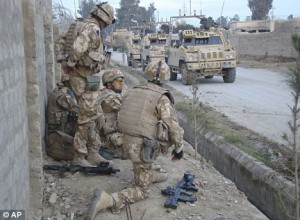Monday
Mar152010
Israel-Palestine: Petraeus' Intervention Shakes Up US Policy?
 Monday, March 15, 2010 at 8:43
Monday, March 15, 2010 at 8:43  I'm not a big fan of General David Petraeus' interference in US foreign policymaking, given his challenge to (and potential undermining) of his President on an issue such as Afghanistan, but Mark Perry in Foreign Policy offered a tale where Petraeus' manoeuvres may lead to a significant --- and, I think, productive --- re-alignment in US foreign policy.
I'm not a big fan of General David Petraeus' interference in US foreign policymaking, given his challenge to (and potential undermining) of his President on an issue such as Afghanistan, but Mark Perry in Foreign Policy offered a tale where Petraeus' manoeuvres may lead to a significant --- and, I think, productive --- re-alignment in US foreign policy. To be blunt, if you take a charitable interpretation of Petraeus' move (he was telling the US diplomats to get out of their dead end of caving to Israeli steps such as settlement expansion) rather than the cynical one (he was again seeking to expand his authority), this may open up a prospect --- limited but visible --- of the US staking out a position where it can challenge Israel's unilateral obstacles to the peace process.
Israel: Obama Shows His Teeth, Netanyahu Steps Back?
On Jan. 16, two days after a killer earthquake hit Haiti, a team of senior military officers from the U.S. Central Command (responsible for overseeing American security interests in the Middle East), arrived at the Pentagon to brief Joint Chiefs of Staff Chairman Adm. Michael Mullen on the Israeli-Palestinian conflict.
The team had been dispatched by CENTCOM commander Gen. David Petraeus to underline his growing worries at the lack of progress in resolving the issue. The 33-slide, 45-minute PowerPoint briefing stunned Mullen. The briefers reported that there was a growing perception among Arab leaders that the U.S. was incapable of standing up to Israel, that CENTCOM's mostly Arab constituency was losing faith in American promises, that Israeli intransigence on the Israeli-Palestinian conflict was jeopardizing U.S. standing in the region, and that Mitchell himself was (as a senior Pentagon officer later bluntly described it) "too old, too slow ... and too late."
The January Mullen briefing was unprecedented. No previous CENTCOM commander had ever expressed himself on what is essentially a political issue; which is why the briefers were careful to tell Mullen that their conclusions followed from a December 2009 tour of the region where, on Petraeus's instructions, they spoke to senior Arab leaders. "Everywhere they went, the message was pretty humbling," a Pentagon officer familiar with the briefing says. "America was not only viewed as weak, but its military posture in the region was eroding." But Petraeus wasn't finished: two days after the Mullen briefing, Petraeus sent a paper to the White House requesting that the West Bank and Gaza (which, with Israel, is a part of the European Command -- or EUCOM), be made a part of his area of operations. Petraeus's reason was straightforward: with U.S. troops deployed in Iraq and Afghanistan, the U.S. military had to be perceived by Arab leaders as engaged in the region's most troublesome conflict.
[UPDATE: A senior military officer denied Sunday that Petraeus sent a paper to the White House.
"CENTCOM did have a team brief the CJCS on concerns revolving around the Palestinian issue, and CENTCOM did propose a UCP change, but to CJCS, not to the WH," the officer said via email. "GEN Petraeus was not certain what might have been conveyed to the WH (if anything) from that brief to CJCS."
(UCP means "unified combatant command," like CENTCOM; CJCS refers to Mullen; and WH is the White House.)]
The Mullen briefing and Petraeus's request hit the White House like a bombshell. While Petraeus's request that CENTCOM be expanded to include the Palestinians was denied ("it was dead on arrival," a Pentagon officer confirms), the Obama administration decided it would redouble its efforts -- pressing Israel once again on the settlements issue, sending Mitchell on a visit to a number of Arab capitals and dispatching Mullen for a carefully arranged meeting with the chief of the Israeli General Staff, Lt. General Gabi Ashkenazi. While the American press speculated that Mullen's trip focused on Iran, the JCS Chairman actually carried a blunt, and tough, message on the Israeli-Palestinian conflict: that Israel had to see its conflict with the Palestinians "in a larger, regional, context" -- as having a direct impact on America's status in the region. Certainly, it was thought, Israel would get the message.
Israel didn't. When Vice President Joe Biden was embarrassed by an Israeli announcement that the Netanyahu government was building 1,600 new homes in East Jerusalem, the administration reacted. But no one was more outraged than Biden who, according to the Israeli daily Yedioth Ahronoth, engaged in a private, and angry, exchange with the Israeli Prime Minister. Not surprisingly, what Biden told Netanyahu reflected the importance the administration attached to Petraeus's Mullen briefing: "This is starting to get dangerous for us," Biden reportedly told Netanyahu. "What you're doing here undermines the security of our troops who are fighting in Iraq, Afghanistan and Pakistan. That endangers us and it endangers regional peace." Yedioth Ahronothwent on to report: "The vice president told his Israeli hosts that since many people in the Muslim world perceived a connection between Israel's actions and US policy, any decision about construction that undermines Palestinian rights in East Jerusalem could have an impact on the personal safety of American troops fighting against Islamic terrorism." The message couldn't be plainer: Israel's intransigence could cost American lives.
There are important and powerful lobbies in America: the NRA, the American Medical Association, the lawyers -- and the Israeli lobby. But no lobby is as important, or as powerful, as the U.S. military. While commentators and pundits might reflect that Joe Biden's trip to Israel has forever shifted America's relationship with its erstwhile ally in the region, the real break came in January, when David Petraeus sent a briefing team to the Pentagon with a stark warning: America's relationship with Israel is important, but not as important as the lives of America's soldiers. Maybe Israel gets the message now.

